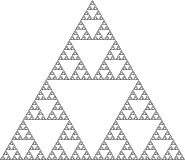Scraps from various sources and my own writings on Generative AI, AGI, Digital, Disruption, Agile, Scrum, Kanban, Scaled Agile, XP, TDD, FDD, DevOps, Design Thinking, etc.
Page Hits
Wednesday, January 30, 2019
Monday, January 28, 2019
Fractals and Agile
Fractalfoundation.org
A fractal is a never-ending pattern. Fractals are infinitely complex patterns that are self-similar across different scales. They are created by repeating a simple process over and over in an ongoing feedback loop. Driven by recursion, fractals are images of dynamic systems – the pictures of Chaos. Geometrically, they exist in between our familiar dimensions. Fractal patterns are extremely familiar, since nature is full of fractals. For instance: trees, rivers, coastlines, mountains, clouds, seashells, hurricanes, etc. Abstract fractals – such as the Mandelbrot Set – can be generated by a computer calculating a simple equation over and over.
A fractal is a never-ending pattern. Fractals are infinitely complex patterns that are self-similar across different scales. They are created by repeating a simple process over and over in an ongoing feedback loop. Driven by recursion, fractals are images of dynamic systems – the pictures of Chaos. Geometrically, they exist in between our familiar dimensions. Fractal patterns are extremely familiar, since nature is full of fractals. For instance: trees, rivers, coastlines, mountains, clouds, seashells, hurricanes, etc. Abstract fractals – such as the Mandelbrot Set – can be generated by a computer calculating a simple equation over and over.
Mathematical fractals are generated by applying a feedback loop to a system.
Z = Z2 + C
Tathagat Varma.
- Mathematical fractals unlike natural fractals can keep self repeating indefinitely.
- They are the best examples of - Simplicity leads to complexity.
- They appear complex, but are essentially repeating a basic shape repeatedly, infinitely.
- Fractals are nature's mechanism to replicate organization without exhibiting a central control.
- Agility could be modeled as a fractal behaviour of software teams to ensure the core focus on agility loop is always retained, despite scale.
- In practice, the notion of agility at each level would undergo changes but the core behavior of agility loop gets preserved, and allows agility to grow scale free!
Friday, January 25, 2019
Agile Cereal Box for Product Vision
- Source - Reqtest.com
- Product vision describes the product’s goals and customer value. It relates to the problem that the product solves.
- Vision improves clarity.
- A good vision can be used to accept or reject requirements.
- Product vision box was introduced by Jim Highsmith and can be used for both traditional as well as Agile projects.
- Basic idea: create and actual physical box that has to be used to market the product. Common analogy is a Cereal Box.
- Divide team into two. Multiple boxes. Series of intermediate boxes.
- Takes 40 minutes to 1 hour.
- Front - product name with picture or drawing, slogan, and three to four main selling points.
- Back - a more detailed view of the product, listing functionality, requirements, etc.
Thursday, January 24, 2019
Lean Canvas - Leanstack.com - Ash Maurya
- Lean Canvas is a planning method to get to the heart of your "idea".
- It is a single-page business plan
- An elaborate business plan with financial forecast and a detailed product road map, many times, may be too early because a lot of this information may be simply unknown during the early stages.
- Forcing an elaborate plan as a pre-condition to funding silently kills a lots of ideas out of sheer inertia because a lot of things never get started / or the world has changed.
- Lean Canvas is an adaptation of Business Model Canvas.
Wednesday, January 23, 2019
Subscribe to:
Comments (Atom)
If we already have automation, what's the need for Agents?
“Automation” and “agent” sound similar — but they solve very different classes of problems. Automation = Fixed Instruction → Fixed Outcome ...
-
Requirements Analysis -- Business requirements document or business requirements specification System Design -- Systems requireme...

















